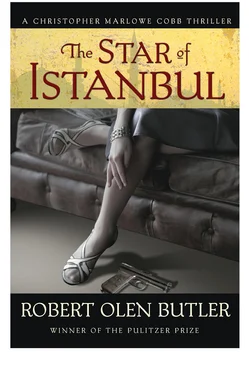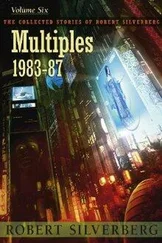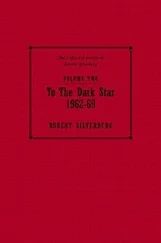She smiled again, a quick, sly one. “I’m sure, nevertheless, you’ll put my details to good use.”
“I will.”
She said, “No longer her lover, I would guess, since she’s been in the United States making movies for the past two years while he’s been in Germany turning into the Kaiser’s personal documentarian.”
My own breath caught at that. But I kept quiet.
“Kurt Fehrenbach,” Gwendolyn said. “He came out of Max Reinhardt’s troupe and did a film called Der Lilim . Very interesting. Propelling our infant art form into precocious adolescence. A work of expressionism about a modern-day daughter of Lilith. Played by Miss Bourgani. Do you know about succubi, Mr. Cobb?”
“They are quite passionate women who keep late hours,” I said.
I had already passed up a chance to flirt with Gwendolyn Bryce — rightly — but here I was doing it again, though quite archly, expecting her not even to pick up on it. But for the very reason I wanted to flirt, she picked up on it.
“I am all work, Mr. Cobb,” she said, though with a glint about her that made her declaration ironic, which was, no doubt, her own style of flirting.
This had to end.
“So they broke up,” I said.
“She came home. He went to Berlin.”
“What’s her real story?”
“The gaps? Nobody has found out. She stays mysterious, which is how she wants it. And she’s good at it. You want to know about Theda Bara? Born in Egypt to an Arab sheikh? Stuff and nonsense. She’s from Cincinnati, Ohio, and her father was a tailor. Lillian Gish, the gorgeous child? She was nineteen, not sixteen, when Griffith started her off, which is just as well because he started her off in more ways than one. But Selene Bourgani? Her romantic, humble beginnings on the island of Andros of course have no records to confirm them, and who knows where to look next.”
“So what you know about her is that no one knows anything.”
“We do know about Herr Fehrenbach. What happens on and around movie sets are things a reporter can work on. So there are some other names, if you’d like the list.”
“I wouldn’t,” I said, and I tried to sound cynically bored about that. I tried not to stir around in my chair. Both these things were difficult. One might have expected my squirminess to lead me to reconsider making that offer to Gwendolyn Bryce: You put your newspaper to bed and I’ll put you to bed . But even if I tried, I couldn’t have done that now. The image of the damp wisps of hair clinging to Selene’s neck had been tormentingly revived by the thought of her other men. And the lock I most wanted to pick later tonight was on St. Martin’s Lane.
I would’ve had more luck with the editor’s daughter.
At 2 A.M. on Monday morning, my leather roll of entry tools tucked in an inside pocket, I moved briskly along St. Martin’s Lane, the crowds of diners and theatergoers that nightly jammed this narrow, electric-lit street mostly dissipated, and the shops darkened. The numbers were descending and I passed a pub at the corner of New Street, number 58, and then a narrow alley of bow-windowed houses, still lit by gas, and only a few more steps ahead was number 53, and from the storefront I reckoned it to be, a piss-yellow light was dribbling into the street. I stopped. I crossed to the other side. Almost directly opposite the meeting site was the opening to Cecil Court. I stepped around the darkened pub at the corner and then edged back to lurk and watch.
Number 53 split the ground floor of a four-story brick building with number 52, a Friends Meeting House, the Quakers narrowly on the right, behind a pair of double doors, and the Germans sporting a wide storefront window to the left of their oaken door with a three-tier glass transom. They were Metzger & Strauss, Booksellers. The locus of German agents in London was a bookshop sharing a wall with a bunch of pacifists.
The light was coming from the back of the bookshop, through an inner door, and from a nearer spot of light — a desk lamp, I supposed — in the midst of the massive shadows of bookshelves. I could see no figures. But this was hardly the time for breaking and entering. Too bad. I would have liked a private preview of the evening’s meeting spot. I’d have to do it another way in a few hours, after they were open, not so private but still a preview. And that meant deciding about who I would become — who I would portray — a decision that had lately been looming anyway.
I slipped away south on St. Martin’s Lane, striding quickly, and I passed before The Duke of York’s Theatre, its neoclassic columns a trifling echo of the portico columns of St. Martin-in-the-Fields, just down at the end of the lane. Mother played a trifling comedy at the Duke of York’s in a short run after Taming of the Shrew, when I had my adolescent London adventure with her.
The ironies of the last few minutes multiplied and I fairly trotted back to the hotel, where I slept fitfully and woke to find, in my morning paper over my eggs and bacon and marmalade in the Palm Court, a Christopher Cobb byline pinned beneath a trumpet blare of a double-deck headline:
LUSITANIA HORROR
Eyewitness Account
Reginald Bryce, true to his word. I held my breath as I scanned the front page of the Daily Transcript and its jump-page spread, and I saw only stock photos of the Lusitania and of a German U-boat and a cartoon of the Kaiser thigh-deep in the ocean with blood dripping from his hands. I let go of the breath when I found no stock photos of me.
I needed now to consider a disguise for my book browsing this morning; this gave me more options. I put my paper down and picked up my coffee to think. Across the sunken floor — bright beneath the glass roof — between the potted palms, near the piano at the far side, sat a man who’d caught my eye when he’d come in a few minutes ago. He was a thin man in a gray tweed suit with a beard and Brilliantine-assaulted hair made to lie flat on either side of a center part. It was the beard that caught me now. He had a newspaper before him — not the Transcript —slightly raised but not enough to shield his face. He glanced up very briefly, directly at me from across the way, and I looked off abruptly. His beard wouldn’t change by his realizing I was studying him, but my impulse was to observe unobserved. I glanced back at him and he was reading.
His beard was full but moderately so, trimmed square beneath his chin. It was a beard that registered strongly as one but didn’t draw attention to itself. If I were to do a beard that wasn’t my own, that would be the one. But the principle I’d learned — not just from Trask’s boys but from my years hanging around theaters — was that simpler is better. The less you change of yourself to resemble someone else, the more comfortable you’ll be in your role.
No one at 53 St. Martin’s Lane knew what I looked like. I could be anyone. I could be German. Outwardly I was ready.
Two hours later I figured the shop at 53 St. Martin’s Lane would be open and I went out of my hotel room, thinking about the challenge before me and closing my door even as the Please Do Not Disturb sign flapped at my hip. The door clicked shut and I took a step away and saw the girl with her cleaning cart down the corridor. I stopped and turned back. But the sign had caught its lower edge in the doorway and was angled directly at me, telling me not to disturb the room. Perhaps my readiness to pick locks had made me more sensitive about people entering my own space. I accepted the sign’s advice and went on. I’d always wondered why you’d make a bed you were going to unmake a few hours later anyway.
And at number 53 there was another sign asking for no disturbances, a hand-written one propped in the corner of the window near the door: CLOSED TODAY. I’d seen no troubles on my walk west from the hotel. After all, the Admiralty and the main government offices were only just south of where I was standing, and St. James Park and Buckingham Palace were a little farther west of that. This neighborhood was the haunt of the upper class. But one of the prime page-2, Lusitania -related stories in the Transcript this morning had been an account of the widespread anti-German rioting in the slums. Mobs had been roaming through the East End looting shops run by Germans. In another part of town, not so far away, the Metzger & Strauss, Booksellers sign would have been a billboard for a brick through the window. On the day of the “delivery,” these boys wanted to play it cautious.
Читать дальше












